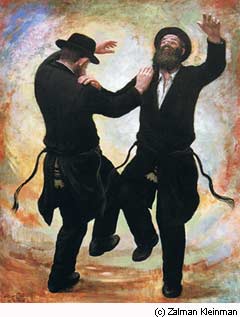 Repentance
Repentance Entries from July 1, 2019 - July 31, 2019
Do The Teshuva!
 Thursday, July 25, 2019 at 03:52PM
Thursday, July 25, 2019 at 03:52PM  From the Charleston to the Mashed Potato to Flossing, every dance move needs a name; but if you want to do the Teshuva, you’ll need a Rabbi to show you how.
From the Charleston to the Mashed Potato to Flossing, every dance move needs a name; but if you want to do the Teshuva, you’ll need a Rabbi to show you how.The Day the Cows Repented
 Tuesday, July 16, 2019 at 10:12AM
Tuesday, July 16, 2019 at 10:12AM  No details. Just an eight-word prophecy of destruction, delivered by a strange-looking foreigner. A man with ragged clothes and ugly skin walked through the heart of a great city and repeated himself over and over: “Yet forty days and Nineveh will be overthrown.”
No details. Just an eight-word prophecy of destruction, delivered by a strange-looking foreigner. A man with ragged clothes and ugly skin walked through the heart of a great city and repeated himself over and over: “Yet forty days and Nineveh will be overthrown.”
This is the story of a God named Yahweh, a man named Jonah, and a city called Nineveh: a city 600 miles away from Jerusalem, a city known for its wealth, its size—and its barbarity. God sent a nobody (a Jewish prophet) to warn the Assyrian city of Nineveh that destruction was coming. Without advertising in advance, without setting up a diplomatic meeting between representatives of two countries, God’s message was plain and direct: in forty days your capital city is doomed.
And then something remarkable happened. The people of the city listened to the message. Really listened. From the city streets and among the storefront shops a grassroots response grew. People believed the message and took action: they repented. In the ancient world there were protocols for repentance, outward actions that signaled you were turning around. The people of Nineveh quit eating. They took off their work clothes or party clothes and dressed in burlap sacks, rich and poor alike agreed on these signs as a response, “We hear you, God of Israel, and we will change.” Even the king of Nineveh, isolated in his royal palace, became one with his people, fasting and shedding the royal silks. He took the cold ashes from the fireplace and poured them on his head.
Just in case there was someone who had not yet gotten with the program the king sent out a formal notice: “Everybody: repent.” And the king meant everybody: his decree went a step further and demanded that the livestock of the city should join in these acts of repentance. “Stop feeding your animals,” he said, “Let them repent with us.” Can you imagine the noise rising up from the city as from every stall, every pen, and every chicken coup the animals began to complain? Even the lowing of the cattle rose up as a prayer of repentance. It was the day the cows repented. And Yahweh heard. He saw that from great to small, from human to bovine, this group of people was willing to change their ways.
Here’s the thing about God: his pronouncements of judgment are not final; they are invitations to repent. The message delivered by the prophet had started a countdown to destruction, but God could stop the clock—and he did so when he saw the response rise up from the streets and reach the highest levels of government. These people took judgment seriously, and God took them seriously. Crisis, averted; peace, restored; mercy, bestowed.
Here’s the thing about repentance: anyone can do it, apparently even your livestock. You don’t have to be a religious person. You don’t have to be a citizen of a select nation. To anyone willing to change God gives the grace for change. Repentance is the outward sign of an inner willingness.
And here’s another thing about repentance: it’s not about the messenger. One of the most surprising aspects about the Old Testament book of Jonah is that Jonah, the prophet, is the “bad guy” in this story. Even though he hears a message directly from God, he has no intention of delivering it because he thinks the people receiving the message do not deserve God’s mercy (check out Jonah 4:2 for the interpretive key to the entire book). Jonah tries to get as far away from Nineveh as he can—but he’s overruled by God (and an enormous fish). Jonah finally delivers the message. You can imagine the begrudging, snarling tone of voice as Jonah walks through the massive city for three days. The people respond, but he’s livid when the people of Nineveh repent. He cares more about having a shady hillside perch so he can watch the fire and brimstone fall. Even though the messenger is filled with hatred for these people, they receive the message. Even though the messenger delivers the message in the most perfunctory way, they receive the message. Even though the messenger is rooting for their own destruction, they receive the message. Wouldn’t it be a tragedy for you or me if we let someone else get in the way of our repentance?
But that would never happen in our day. It would never happen to you or me. It only happens in old Bible stories, right? Right?


